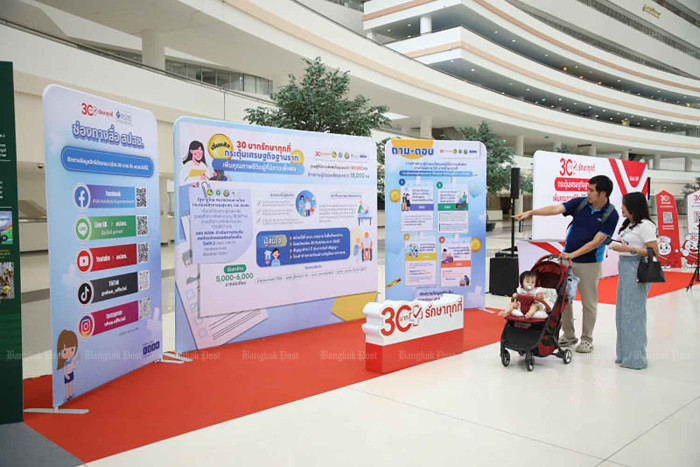
A family reads information about the ‘30 Baht Universal Healthcare Anywhere’ programme that the National Health Security Office kicked off at Government Complex in Bangkok in August. Varuth Hirunyatheb
The controversy over funding the 30-baht universal healthcare scheme has exposed a stark reality: Thailand’s healthcare system may be teetering on the brink of financial collapse.
In recent months, a war of words between the National Health Security Office (NSHO) and the director of privately owned Mongkutwattana Hospital, Dr Rienthong Nanna, has given the public a glimpse into how the universal healthcare scheme is run.
Citing a long-overdue payment of about 100 million baht from the NHSO, Dr Rienthong says his hospital will suspend medical services to outpatients holding 30-baht healthcare cards, under the so-called gold card scheme.
The Ministry of Public Health, meanwhile, admits many hospitals under its responsibility have run up an accumulated deficit of about 18 billion baht, as expenditures are 110% higher than revenue.
These hospitals have asked the ministry to provide a short-term solution by approving 8 billion baht from the the central budget to continue running the scheme.
Medical staff have also called for the NHSO reform. Their call is echoed by hospitals, clinics and community clinics that are the NHSO’s major partners.
Dr Pawinee Eamchan, director of Saraburi Hospital and chairwoman of the regional hospital and general hospital club, said hospitals are at the healthcare frontline and have an obligation to treat patients regardless of budget constraints.
“The gold card controversy is a pressing issue and will have a big impact on the national healthcare system if it is not fixed, Dr Pawinee said.
“Now, we can still provide services because of money from people’s donations,” she said.
Saraburi Hospital’s account has been in the red, running a deficit of over 120 million baht. Delayed payment, insufficient budget and the expansion of medical services to provide patients with advanced medicine and medical treatment have caused a financial crisis.
The NHSO’s budget allocation to hospitals is calculated using AdjRW (Adjusted Relative Weight) and is based on a per-head formula.
Currently, NHSO allocates 8,350 baht per head, which is significantly lower than the actual average cost at 13,240 baht.
The per-head rate is even lower than 7,000 baht in some hospitals when NHSO applies a new regulation allowing for backward calculation, or the so-called re-run system, from the period of Oct 1, 2024, to July 31, 2025.
Some state-owned hospitals have opted to provide second-tier medical treatment and even alternative drug prescriptions to cope with limited budgets.
Medical groups have demanded cancellation of the rerun system and called for a new fund for in-patients to compensate for the loss from AdjRW.
Under the fiscal budget for 2026, the government approved 265.30 billion baht for the national health security fund, which is divided into 198.23 billion baht for care for 47.5 million gold-card holders, a 16.38 billion baht increase from last year.
The remaining 3.8 billion baht is allocated to local administrative organisations, 27.76 billion to the disease prevention and promotion scheme, 4.6 billion baht for Aids patients and 16.08 billion for patients living with kidney diseases.
Just 562.22 million baht is allocated as an emergency fund for health providers, however.
NHSO is now under heavy criticism, especially from medical service providers who are unhappy with its performance and say the office often ignores them.
They have called for more medical service providers to sit on the NHSO’s committee. Currently, there’s only one. Medical service providers should be treated as a trusted partner by the NHSO, not as “a boss and an employee”, said one medical service provider.
Without providing sufficient financial support to medical service providers, NHSO and the Ministry of Public Health will be blamed for poor healthcare services and possible mass resignations of medical staff from state-owned hospitals.
Thais under the gold-card scheme will be the ones who suffer from such poor management, said one medical staff member.

